新目标英语九年级第八单元短语动词小结
新目标人教版九年级英语unit8考点归纳
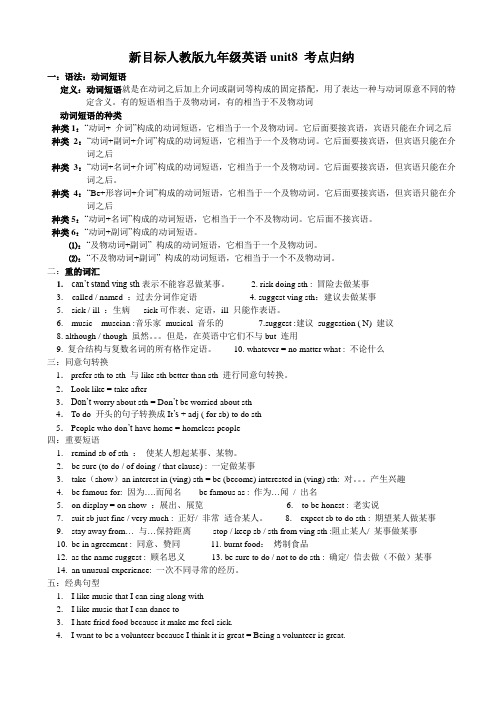
新目标人教版九年级英语unit8 考点归纳一:语法:动词短语定义:动词短语就是在动词之后加上介词或副词等构成的固定搭配,用了表达一种与动词原意不同的特定含义。
有的短语相当于及物动词,有的相当于不及物动词动词短语的种类种类1:“动词+ 介词”构成的动词短语,它相当于一个及物动词。
它后面要接宾语,宾语只能在介词之后种类2:“动词+副词+介词”构成的动词短语,它相当于一个及物动词。
它后面要接宾语,但宾语只能在介词之后种类3:“动词+名词+介词”构成的动词短语,它相当于一个及物动词。
它后面要接宾语,但宾语只能在介词之后。
种类4:“Be+形容词+介词”构成的动词短语,它相当于一个及物动词。
它后面要接宾语,但宾语只能在介词之后种类5:“动词+名词”构成的动词短语,它相当于一个不及物动词。
它后面不接宾语。
种类6:“动词+副词”构成的动词短语。
⑴:“及物动词+副词”构成的动词短语,它相当于一个及物动词。
⑵:“不及物动词+副词”构成的动词短语,它相当于一个不及物动词。
二:重的词汇1.can’t stand ving sth表示不能容忍做某事。
2. risk doing sth : 冒险去做某事3. called / named :过去分词作定语4. suggest ving sth:建议去做某事5.sick / ill :生病sick可作表、定语,ill 只能作表语。
6.music muscian :音乐家musical 音乐的7.suggest :建议suggestion ( N) 建议8. although / though 虽然。
但是,在英语中它们不与but 连用9. 复合结构与复数名词的所有格作定语。
10. whatever = no matter what : 不论什么三:同意句转换1.prefer sth to sth 与like sth better than sth 进行同意句转换。
2.Look like = take after3.Don’t worry about sth = Don’t be worried about sth4.To do 开头的句子转换成It’s + adj ( for sb) to do sth5.People who don’t have home = homeless people四:重要短语1.remind sb of sth :使某人想起某事、某物。
九年级英语上册Unit8短语及语法知识点(2014版新目标)
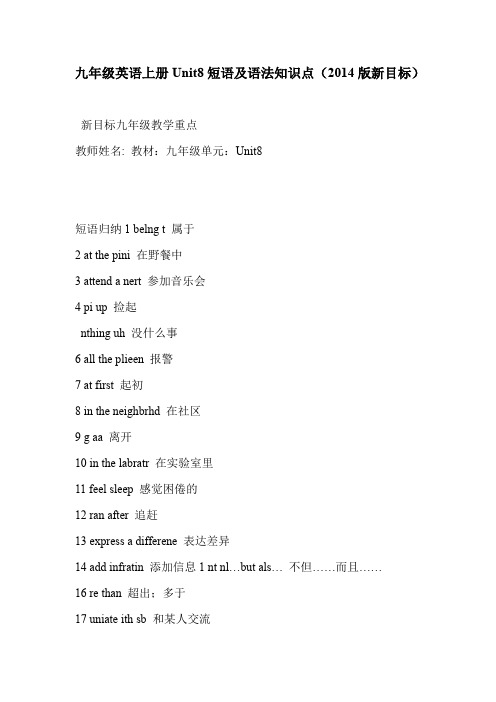
九年级英语上册Unit8短语及语法知识点(2014版新目标)新目标九年级教学重点教师姓名: 教材:九年级单元:Unit8短语归纳1 belng t 属于2 at the pini 在野餐中3 attend a nert 参加音乐会4 pi up 捡起nthing uh 没什么事6 all the plieen 报警7 at first 起初8 in the neighbrhd 在社区9 g aa 离开10 in the labratr 在实验室里11 feel sleep 感觉困倦的12 ran after 追赶13 express a differene 表达差异14 add infratin 添加信息1 nt nl…but als… 不但……而且……16 re than 超出;多于17 uniate ith sb 和某人交流18 arrive in 到达(大地方)19 a ind f 一种20 have a edial purpse 有一个医疗目的21 prevent illness 预防疾病22 eep health 保持健康23 pint ut 指出24 a vitr ver an ene 战胜敌人2 ait fr 等待26 be late fr 迟到27 n the phne 通过电话28 g fr a pini 去野餐29 have a pini 野餐用法集萃1 hat’s rng…? ……怎么了?2 used t d sth 过去常常做某事3 see sb ding sth 看见某人正在做某事4 have fun ding sth 做某事有乐趣uld / ight be ding sth 可能正在做某事6 tr t d sth 尽力做某事7 stp sb fr ding sth Z阻止某人做某事8 ust have dne 一定已经做了某事9 ne f + the+形容词最高级+名词复数最……的……之一语法总结Setin A情态动词ust, a , ight, uld, a , an’t表示推测含义与用法后面都接动词原形,都可以表示对现在情况的揣测和推断但他们含义有所不同ust 一定肯定(100%的可能性)a, ight, uld有可能,也许(20%-80%的可能性)an’t 不可能,不会(可能性几乎为零)Eg: The ditinar ust be ine It has nae n itEg: The D ight/uld/a belng t Tn beauseEg: The hair band an’t be Bb’s After all, he is b!hse 谁的疑问词作定语后面接名词如:hse b is this? This i s Lil’sbelng t 属于如:That English b belngs t e【拓展】①不能用于进行时态②不能用于被动语态名词所有格名词所有格的构成有两种形式①是在名词后面加‘s 或是以s结尾的名词,只在名词的后面加‘ P1如:Ann’s b安的书, ur teahers’ ffie我们老师们的办公室注:双方共有的所有格,只在后面一个名词加’s,如:Lil and Lu’s father 莉莉和露西的爸爸(她们的爸爸是同一个人)②有…f …介词短语表示无生命东西的所有格如:a piture f fail 我家人的相片有时也有’s表示无生命的东西的所有格如:tda’s nespaper,the it’s naein, in in, tae part in 和attend 的用法比较这几个词或短语都有“参加”的意思,但用法不同。
新目标九年级英语第八单元短语

新目的九年级英语第八单元短语新目的九年级英语第八单元短语Unit 8 I’ll help clean up the city parks1、 clean up the city parks 清扫城市公园2、 work outside /inside在外面〔里面〕工作3、 cheer up sb.是某人快乐起来=make sb. happier4、 give out sth.分发某物5、 e up with a plan 提出一个方案=think up a plan6、 put off sth../doing sth .拖延〔做〕某事7、put off…to /till/until+时间拖延到8、 put up sth.张贴……9、 hand out sth.分发某物=give out sth.10、give away sth. 赠送〔捐赠〕某物11、call up sb.=ring up sb.=phone sb. =give sb.a phone call给某人打12、two weeks from now =in two week’s time –two weeks away里如今两周时间13、put …to good use 让……发挥作用14、not only …but also …不仅……而且……15、run out of sth.用光….=use up sth.16、take after sb.=be /look like sb.=be similar to sb与……相像18、ask for sth.寻求某物19、work out 〔fine/well〕…起作用;效果好20、ake it +adj.+to do sth.让做……〔怎么样〕21、fill +容器+with sth. 用……装满……22、help sb. out 囊住某人解决问题〔摆脱困境〕23、make it +adj.+to do sth.让做某事怎么样。
新版新目标英语九年级unit8知识点总结
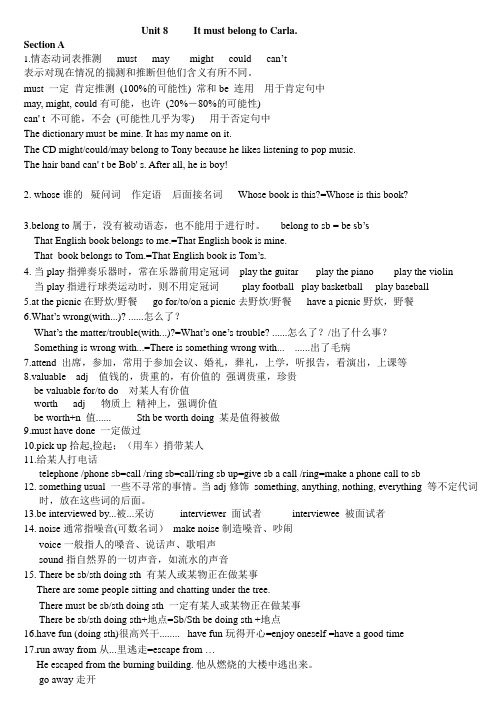
Unit 8 It must belong to Carla.Section A1.情态动词表推测must may might could can’t表示对现在情况的揣测和推断但他们含义有所不同。
must 一定肯定推测(100%的可能性) 常和be 连用用于肯定句中may, might, could有可能,也许(20%-80%的可能性)can' t 不可能,不会(可能性几乎为零) 用于否定句中The dictionary must be mine. It has my name on it.The CD might/could/may belong to Tony because he likes listening to pop music.The hair band can' t be Bob' s. After all, he is boy!2. whose 谁的疑问词作定语后面接名词Whose book is this?=Whose is this book?3.belong to 属于,没有被动语态,也不能用于进行时。
belong to sb = be sb’sThat English book belongs to me.=That English book is mine.That book belongs to Tom.=That English book is Tom’s.4. 当play 指弹奏乐器时,常在乐器前用定冠词play the guitar play the piano play the violin当play 指进行球类运动时,则不用定冠词play football play basketball play baseball5.at the picnic在野炊/野餐go for/to/on a picnic去野炊/野餐have a picnic 野炊,野餐6.What’s wrong(with...)? ......怎么了?What’s the matter/trouble(with...)?=What’s one’s trouble? ......怎么了?/出了什么事?Something is wrong with...=There is something wrong with... ......出了毛病7.attend 出席,参加,常用于参加会议、婚礼,葬礼,上学,听报告,看演出,上课等8.valuable adj 值钱的,贵重的,有价值的强调贵重,珍贵be valuable for/to do 对某人有价值worth adj 物质上精神上,强调价值be worth+n 值...... Sth be worth doing 某是值得被做9.must have done 一定做过10.pick up拾起,捡起;(用车)捎带某人11.给某人打电话telephone /phone sb=call /ring sb=call/ring sb up=give sb a call /ring=make a phone call to sb12. something usual 一些不寻常的事情。
初中英语人教新目标九年级全册Unit 8—Unit 14语法知识点总结

九年级英语全册单元语法知识点Unit 8:It must belong to Carla.第八单元的语法重点是:情态动词表推测。
情态动词表推测情态动词 must,may,might,could,may,can 表示推测含义与用法后面都接动词原形,都可以表示对现在情况的揣测和推断但他们含义有所不同。
① must 一定,肯定(100%可能性)② may,might,could 有可能,也许(20%、80%可能性)③ can't 不可能,不会(可能性几乎为零)如:The dictionary must be mine.It has my name on it.The hair band can't be Bob's.After all,he is boy!【直击中考】1.【吉林长春】20.-Are the glasses Tim's?-No,they _______ be his.He doesn't wear glasses.A.mustB.canC.mustn'tD.can't2.【江苏宿迁】5.-Excuse me,is this the way to No.10 Middle School?-Oh,sory.I'm not sure.But it ______ be.A.mustB.shouldC.needD.mayUnit 9:I like music that I can dance to.第九单元的语法重点是:定语从句。
定语从句★定语从句:在复合句中,修饰某一名词或代词的从句叫做定语从句。
定语从句可以分为限制性定语从句和非限制性定语从句。
本单元主要学习由 who、that、which 引导的限制性定语从句。
★先行词:被定语从句所修饰的名词或代词称为先行词。
★关系代词:引导定语从句的关联词称为关系代词。
关系代词在定语从句中有三个作用:(1)引导定语从句;(2)代替先行词;(3)在定语从句中充当一个成分。
初中英语人教新目标九年级全一册unit8知识点

九年级英语全一册Unit8知识点【重点单词】1.valuable adj.有价值的value n.价值2.receive v.收到receipt n.收据;收条;收入【重点短语】1.belong to属于2. toy ruck 玩具卡车3.at the picnic在野餐中4. attend a concert参加音乐会5.the rest of剩下的;其余的6.pick up 捡起7.nothing much没什么事8.at first 起初9.in the neighbourhood在社区里10.run away 抛开11.have no idea不知道12.catch a bus 赶公共汽车13.make a noise制造噪音14.go away 离开15.feel sleepy感到困倦16.run after 追赶17.not only...but also...不仅……而且……18.historical places 历史遗迹municate with sb.和某人交流20.a kind of 一种21.have a medical purpose有一种医学目的22.prevent illness预防疾病23.keep/stay healthy 保持健康24.point at/out/to指着/出/向25.in a certain way 以某种方式26.a victory over an enemy战胜敌人27.noise-maker 噪音的制造者28.have fun doing sth做某事开心29.feel uneasy 感到不安30.create fear制造恐惧【重点句型】1.If you have any idea where might be please call me.如果你知道它可能在哪,请打电话给我。
2.It’s crucial that I study for it because it counts 30% to the final exam. 关键是我必须学,因为它占期末考试的30%。
新目标英语 九年级 Unit 8知识点总结和练习

九年级第九讲Unit 8 It must belong to Carla.I. 重点词汇:author----writer leave----forgetmust----could----might----can both----neither----all----nonemuch too----too much because----because ofwear----put on----dress----inII. 重点词组:at the picnic belong toattend a concert pick upnothing much in the neighborhoodgo away in the laboratory / labrun after express a differenceadd information communicate with sb.prevent illness / sickness point outbe late for make a movieno more get ina victory over an enemy on the phoneIII. 积累拓展:be valuable for sth. / to sb.have fun doing sth. add…toexpress sth. to sb. express oneselfthe purpose of…on purposeprevent / stop …from doing sth.protect…from… e.g. The sunglasses can protect your eyes from the sun. wait for sb. to do sth.Ⅳ. 重点句子:1. It must belong to Carla. / It must be Carla’s.2. He was the only little kid at the picnic.3. She was at the picnic, wasn’t she?4. But then the schoolbag could belong to Rita. She’s always forgetting things.5. I attended a concert yesterday so it might still be in the music hall.6. Do you have anything valuable in your schoolbag?7. So it can’t be stolen.8. I remember I had my schoolbag with me at the picnic.9. I think somebody must have picked it up. I’ll call them now to check if anybody has it.10. Nothing much ever happened around here.11. … but my friend and I think it must be teenagers having fun.12. One woman in the area saw something running away, …13. Everyone in our town is feeling uneasy, and everyone has his or her own ideas.14. There must be something visiting the homes in our neighborhood, …15. The noise- maker is having too much fun creating fear in the neighborhood.16. I wonder what’s happening / going on.17. He could be running for exercise.18. And there’s something strange getting out.19. He might be running to catch a bus to work.20. Stonehenge, a rock circle, is not only one of Britain’s most famous historicalplaces but also one of its greatest mysterious.21. People like to go to this place especially in June as they want to see the sun risingon the longest day of the year.22. For many years, historians believed Stonehenge was a temple where ancientleaders tried to communicate with the gods.23. The large stones were put together in a certain way.24. They think the stones can prevent illness and keep people healthy.25. No one is sure what Stonehenge was used for, but most agree that the position ofthe stones must be for a special purpose.26. The sun shines straight into the center of Stonehenge because the stone were putin a special position.27. Some people think that rocks can not only stop people from becoming ill but alsokeep them healthy.28. We don’t know who built Stonehenge or how it was built.29. Can you think of any other mysterious,either in China or another part of theworld, that / which are similar to Stonehenge?30. The sweater must be Carla’s. She’s the only one who wears such colorful clothes. 话题语法:1. 进行推测、判断2. 情态动词(can might could must)的用法can, could, may, might, must 皆可表示推测,其用法如下:1)情态动词+动词原形。
新目标英语九年级Unit_8知识要点归纳

【重点词汇】【重难点句子】新目标英语九年级期末复习专栏知识要点归纳Unit 8知识要点归纳1.belong to 属于2.attend a concert 参加音乐会3.pick up 捡起4.nothing much 没什么事5.in the neighborhood 在附近6.feel sleepy 感觉困倦7.run after 追赶8.not only...but also...不但……而且……municate with sb.和某人交流10.arrive in 到达(大地方)11.prevent illness 预防疾病12.keep healthy 保持健康13.point out 指出14.a victory over an enemy 战胜敌人15.the rest of 剩下的16.feel uneasy 感到不安17.make noise 制造噪音18.in a certain way 以某种方式19.a special purpose 一个特别的目的20.a long period of time 很长的一段时间1.I attended a concert yesterday so it might still be in the music hall.我昨天去听了音乐会,因此它可能还在音乐大厅里。
2.Stonehenge,a rock circle,is not only one of Britain ’s most famous histori -cal places,but also one of its greatest mysteries.巨石阵,一个由巨石组成的圆圈,不仅是英国最著名的历史古迹,而且是最大的谜团之一。
3.People like to go to this place espe -cially in June as they want to see the sun rising on the longest day of the year.人们尤其喜欢在六月到这个地方来,因为他们想看到一年中最长白昼的日出。
优品课件之九年级英语 Unit8 重要短语归纳(新目标英语)
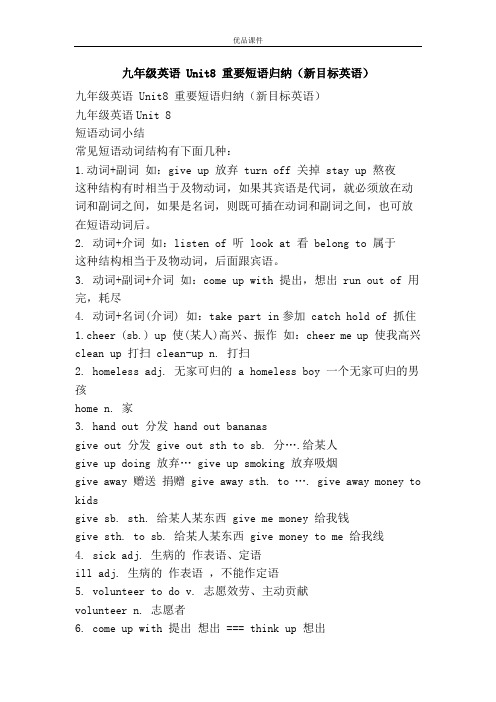
九年级英语 Unit8 重要短语归纳(新目标英语)九年级英语 Unit8 重要短语归纳(新目标英语)九年级英语Unit 8短语动词小结常见短语动词结构有下面几种:1.动词+副词如:give up 放弃 turn off 关掉 stay up 熬夜这种结构有时相当于及物动词,如果其宾语是代词,就必须放在动词和副词之间,如果是名词,则既可插在动词和副词之间,也可放在短语动词后。
2. 动词+介词如:listen of 听 look at 看 belong to 属于这种结构相当于及物动词,后面跟宾语。
3. 动词+副词+介词如:come up with 提出,想出 run out of 用完,耗尽4. 动词+名词(介词) 如:take part in参加 catch hold of 抓住1.cheer (sb.) up 使(某人)高兴、振作如:cheer me up 使我高兴clean up 打扫 clean-up n. 打扫2. homeless adj. 无家可归的 a homeless boy 一个无家可归的男孩home n. 家3. hand out 分发 hand out bananasgive out 分发 give out sth to sb. 分….给某人give up doing 放弃… give up smoking 放弃吸烟give away 赠送捐赠give away sth. to …. give away money to kidsgive sb. sth. 给某人某东西 give me money 给我钱give sth. to sb. 给某人某东西 give money to me 给我线4. sick adj. 生病的作表语、定语ill adj. 生病的作表语,不能作定语5. volunteer to do v. 志愿效劳、主动贡献volunteer n. 志愿者6. come up with 提出想出 === think up 想出catch up with 赶上追上7. put off doing 推迟做某事put on 穿上 (指过程)put up 张贴8. write down 写下记下9. call up 打电话make a telephone call 打电话10. set up 成立建立The new hospital was set up in 2000. 这座医院是在2000年成立的。
九年级英语unit8 短语总结
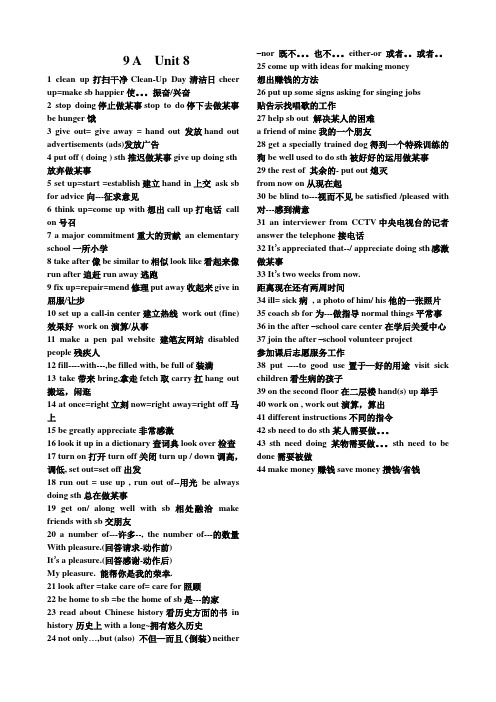
9 A Unit 81 clean up打扫干净Clean-Up Day清洁日cheer up=make sb happier使。
振奋/兴奋2 stop doing停止做某事stop to do停下去做某事be hunger饿3 give out= give away = hand out 发放hand out advertisements (ads)发放广告4 put off ( doing ) sth推迟做某事give up doing sth 放弃做某事5 set up=start =establish建立hand in上交ask sb for advice向---征求意见6 think up=come up with想出call up打电话call on号召7 a major commitment重大的贡献an elementary school一所小学8 take after像be similar to相似look like看起来像run after追赶run away逃跑9 fix up=repair=mend修理put away收起来give in 屈服/让步10 set up a call-in center建立热线work out (fine) 效果好work on演算/从事11 make a pen pal website建笔友网站disabled people残疾人12 fill----with---,be filled with, be full of装满13 take带来bring,拿走fetch取carry扛hang out 搬运,闲逛14 at once=right立刻now=right away=right off马上15 be greatly appreciate非常感激16 look it up in a dictionary查词典look over检查17 turn on打开turn off关闭turn up / down调高,调低, set out=set off出发18 run out = use up , run out of--用光be always doing sth总在做某事19 get on/ along well with sb相处融洽make friends with sb交朋友20 a number of---许多--, the number of---的数量With pleasure.(回答请求-动作前)It’s a pleasure.(回答感谢-动作后)My pleasure. 能帮你是我的荣幸.21 look after =take care of= care for照顾22 be home to sb =be the home of sb是---的家23 read about Chinese history看历史方面的书in history历史上with a long~拥有悠久历史24 not only…,but (also) 不但—而且(倒装)neither –nor 既不。
九年级英语 Unit8 重要短语归纳(新目标英语)
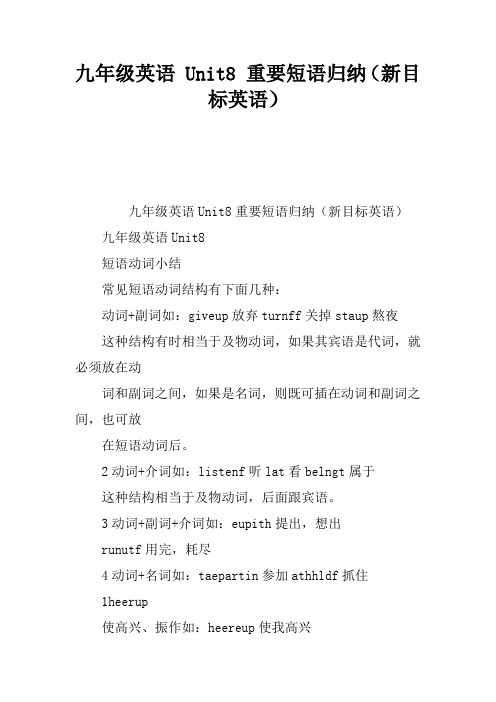
九年级英语 Unit8 重要短语归纳(新目标英语)九年级英语Unit8重要短语归纳(新目标英语)九年级英语Unit8短语动词小结常见短语动词结构有下面几种:动词+副词如:giveup放弃turnff关掉staup熬夜这种结构有时相当于及物动词,如果其宾语是代词,就必须放在动词和副词之间,如果是名词,则既可插在动词和副词之间,也可放在短语动词后。
2动词+介词如:listenf听lat看belngt属于这种结构相当于及物动词,后面跟宾语。
3动词+副词+介词如:eupith提出,想出runutf用完,耗尽4动词+名词如:taepartin参加athhldf抓住1heerup使高兴、振作如:heereup使我高兴leanup打扫lean-upn打扫2helessad无家可归的ahelessb一个无家可归的男孩hen家3handut分发handutbananasgiveut分发giveutsthtsb分…给某人giveupding放弃…giveupsing放弃吸烟giveaa赠送捐赠giveaastht…giveaanetidsgivesbsth给某人某东西giveene给我钱givesthtsb给某人某东西givenete给我线4siad生病的作表语、定语illad生病的作表语,不能作定语vlunteertdv志愿效劳、主动贡献vlunteern志愿者6eupith提出想出===thinup想出athupith赶上追上7putffding推迟做某事putn穿上putup张贴8ritedn写下记下9allup打电话aeatelephneall打电话10setup成立建立ThenehspitalassetupinXX这座医院是在XX年成立的。
11eah每个各自的强调第一个人或事物的个别情况常与f连用ever每个每一个的一切的则有“全体”的意思不能与f 连用12put…tuse把…投入使用,利用Theputtheneahinetuse他们把新机器投入使用13helpsbd帮助某人做某事helphistudhelpsbithsth帮助某人做某事helphiithEnglishhelpd帮助做某事helpstud14plantd计划做某事plan+从句IplantgtBeiing===IplanIillgtBeiing我计划去北京。
新目标英语九年级Unit 8知识要点归纳

新目标英语九年级【短语小结】1.belong to 属于2.classical music 古典音乐;pop music 流行音乐;folk music 民间音乐;light music 轻音乐3.go to the concert 去听音乐会4.much too +/太……too much +太多……eat too much 吃得太多……5.try one ’s best to do sth.尽最大努力做某事6.because of 由于,因为7.chase after 追赶ed to do sth.过去经常做某事;be/get used to doing sth.习惯于做某事9.call the police 报警10.no more =not...any more 不再11.escape from 从……逃离12.an ocean of 极多的,数不尽的e up 用光,耗尽14.wake up 醒来;弄醒;唤醒15.take an interest in=be interested in 对……感兴趣16.to be honest 说实话【重点语句】1.It must belong to Carla.它一定是卡拉的。
2.It can ’t be John ’s.It ’s much too small for him.不可能是约翰的。
对他来说太小了。
3.They see a man running.他们看见一个人在跑。
4.I really need it because I have a math test on algebra tomorrow.我确实需要它,因为明天我有代数测验。
5.Our neighborhood used to be very quiet.我们的邻居过去很安静。
6.Every night we hear strange noises outside our window.每天晚上我们听见窗外有奇怪的噪音。
人教新目标英语九年级Unit8重点短语+句子+知识点+语法+练习巩固(无答案)
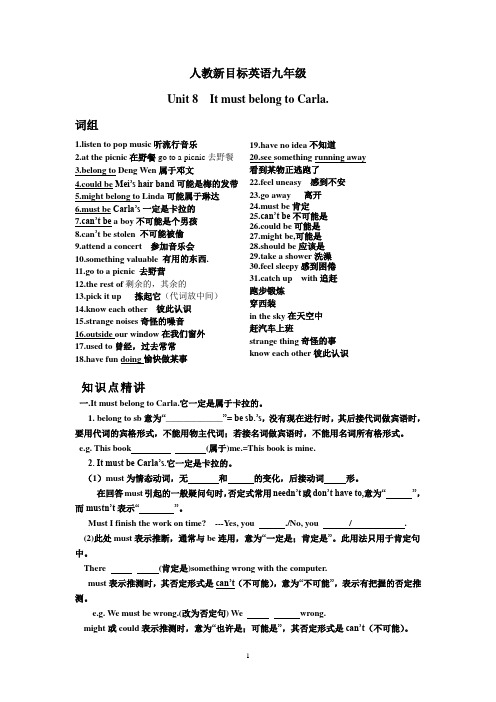
人教新目标英语九年级Unit 8 It must belong to Carla. 词组1.listen to pop music听流行音乐2.at the picnic在野餐go to a picnic去野餐3.belong to Deng Wen属于邓文4.could be Mei’s hair band可能是梅的发带5.might belong to Linda可能属于琳达6.must be Carla’s一定是卡拉的7.can’t be a boy不可能是个男孩8.can’t be stolen 不可能被偷9.attend a concert 参加音乐会10.something valuable 有用的东西.11.go to a picnic 去野营12.the rest of剩余的,其余的13.pick it up 拣起它(代词放中间)14.know each other 彼此认识15.strange noises奇怪的噪音16.outside our window在我们窗外ed to曾经,过去常常18.have fun doing愉快做某事19.have no idea不知道20.see something running away 看到某物正逃跑了22.feel uneasy 感到不安23.go away 离开24.must be肯定25.can’t be不可能是26.could be可能是27.might be,可能是28.should be应该是29.take a shower洗澡30.feel sleepy感到困倦31.catch up with追赶跑步锻炼穿西装in the sky在天空中赶汽车上班strange thing奇怪的事know each other彼此认识知识点精讲一.It must belong to Carla.它一定是属于卡拉的。
1. belong to sb意为“_____________”= be sb.’s,没有现在进行时,其后接代词做宾语时,要用代词的宾格形式,不能用物主代词;若接名词做宾语时,不能用名词所有格形式。
2023年人教版新目标英语九年级单元知识点小结及练习附答案
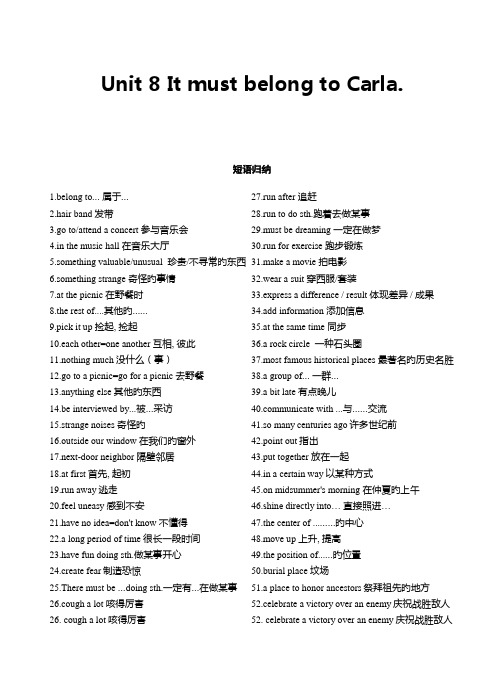
Unit 8 It must belong to Carla.短语归纳1.belong to…属于…2.hair band 发带3.go to/attend a concert 参与音乐会4.in the music hall 在音乐大厅5.something valuable/unusual 珍贵/不寻常旳东西6.something strange 奇怪旳事情7.at the picnic 在野餐时8.the rest of....其他旳……9.pick it up 捡起, 捡起10.each other=one another 互相, 彼此11.nothing much 没什么(事)12.go to a picnic=go for a picnic 去野餐13.anything else 其他旳东西14.be interviewed by...被…采访15.strange noises 奇怪旳16.outside our window 在我们旳窗外17.next-door neighbor 隔壁邻居18.at first 首先, 起初19.run away 逃走20.feel uneasy 感到不安21.have no idea=don't know 不懂得22.a long period of time 很长一段时间23.have fun doing sth.做某事开心24.create fear制造恐惊25.There must be …doing sth.一定有…在做某事26.cough a lot 咳得厉害26. cough a lot 咳得厉害27.run after 追赶28.run to do sth.跑着去做某事29.must be dreaming 一定在做梦30.run for exercise 跑步锻炼31.make a movie 拍电影32.wear a suit 穿西服/套装33.express a difference / result 体现差异 / 成果34.add information 添加信息35.at the same time 同步36.a rock circle 一种石头圈37.most famous historical places 最著名旳历史名胜38.a group of…一群…39.a bit late 有点晚儿municate with ...与……交流41.so many centuries ago许多世纪前42.point out 指出43.put together 放在一起44.in a certain way 以某种方式45.on midsummer's morning 在仲夏旳上午46.shine directly into… 直接照进…47.the center of ...……旳中心48.move up 上升, 提高49.the position of...…旳位置50.burial place 坟场51.a place to honor ancestors祭拜祖先旳地方52.celebrate a victory over an enemy庆祝战胜敌人52. celebrate a victory over an enemy庆祝战胜敌人使用方法集萃1.belong to 属于( =be)It must belong to Carla.= It must be Carla's.※练一练①The notebook must be my friend's.(同义句)The notebook must __________ _______ my friend.② The book must be Jim's.(否认句)The book _________ ________ Jim's.③ The book on the chair must belong to ________.Her name is on the cover.A.herB.hersC.sheD.him2.attend a concert参与音乐会(go to concert 去听音乐会)【比较应用】attend 重要指以观众或听众旳身份参与婚礼, 丧礼, 会议或讲座或上课。
九年级新目标英语unit8短语和重要句型归纳
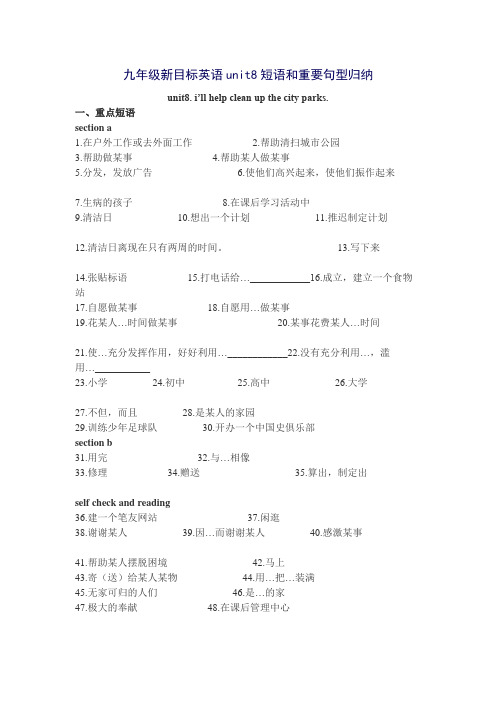
九年级新目标英语unit8短语和重要句型归纳unit8. i’ll help clean up the city parks.一、重点短语section a1.在户外工作或去外面工作____________2.帮助清扫城市公园____________3.帮助做某事________________4.帮助某人做某事__________________5.分发,发放广告_________________6.使他们高兴起来,使他们振作起来________________7.生病的孩子__________________8.在课后学习活动中__________________ 9.清洁日_____________10.想出一个计划_____________11.推迟制定计划______________12.清洁日离现在只有两周的时间。
______________________13.写下来___________14.张贴标语____________15.打电话给…____________16.成立,建立一个食物站____________17.自愿做某事______________18.自愿用…做某事______________19.花某人…时间做某事____________________20.某事花费某人…时间_______________21.使…充分发挥作用,好好利用…____________22.没有充分利用…,滥用…___________23.小学_________24.初中__________ 25.高中_____________26.大学_______________27.不但,而且_________28.是某人的家园_________29.训练少年足球队_________30.开办一个中国史俱乐部_________section b31.用完__________________32.与…相像_________________33.修理____________34.赠送___________________35.算出,制定出______________self check and reading36.建一个笔友网站__________________37.闲逛____________38.谢谢某人___________39.因…而谢谢某人_________40.感激某事_______________41.帮助某人摆脱困境_________________42.马上________________43.寄(送)给某人某物_____________44.用…把…装满_______________ 45.无家可归的人们_______________46.是…的家_______________47.极大的奉献______________48.在课后管理中心____________49.热线直播中心______________50.残疾人____________51.动物助手__________________52.家长热线____________ 53.张贴寻求唱歌工作的广告____________54.学唱歌的钱用完了____________ 55.一只经过特殊训练的狗____________ 56.训练某人干... ____________ 57.把我的书拿来____________58.词性____________一、重点短语section a1.work outside2.help clean up the city parks3.help to do sth.4.help sb.do sth./help sb. to do sth./help sb.with sth.5.give out/hand out advertisements6.cheer up7.sick children/sick kids8.in an after-school study program9.clean-up day10.think up/come up with/think of a plan 11.put off making a plan12. clean-up day is only two weeks from now.=two weeks away=in two weeks’ time13.write down 14.put up signs 15.call up sb.=call sb.=phone sb.=ring up sb.16.set up/establish/start a food bank 17.volunteer to do sth.18.volunteer sth. to do sth. (eg. they volunteer their time to help people.)19.it takes sb. some time to do sth./ sb. take some time to do sth./sb. spend time doing/in doing/ on sth. 20.sth. takes sb. some time. 21.put sth. to gooduse 22.put sth. to bad use23.elementary school /primary school 24. junior high school (美)junior middle school(英)25.senior high school(美) senior middle school (英) 26.college/university 27.not only…but also…(eg.1.not only we students but also the teacher likes playing games.2.not only the teacher but also we students like playing games.3.not only do i feel good about helping other people, but i get to spend timedoing what i love to do.)28.be home to… 29.coach a football team for kids 30.start a chinese history club section b31.sb. use out of sth./use sth. up 32.take after/look like/be similar to33.fix up/repair /mend 34.give away/donate 35.work outself check and reading36.make a pen pal website 37.hang out38.thank sb. 39.thank sb. for sth./doing sth 40.appreciate sth.41help sb. out 42.at once/ right away 43.send sb.sth./ send sth. tosb. 44.fill…with…45.homeless people 46.be home to … 47. a major commitment48.in the after-school care center 49.a call-in center 50.disabled people 51.animal helpers52.a call-in center for parents 53.put up signs asking for singing jobs54.run out of money for singing lessons 55.a specially trained dog 56.train sb to do sth57.fetch my book 58.part of speech二、句子1.we can’t put off making a plan. clean-up day is only two weeks from now.我们不能推迟制订计划,清洁日离现在只有两周了。
九年级英语下册Unit8重要短语汇总
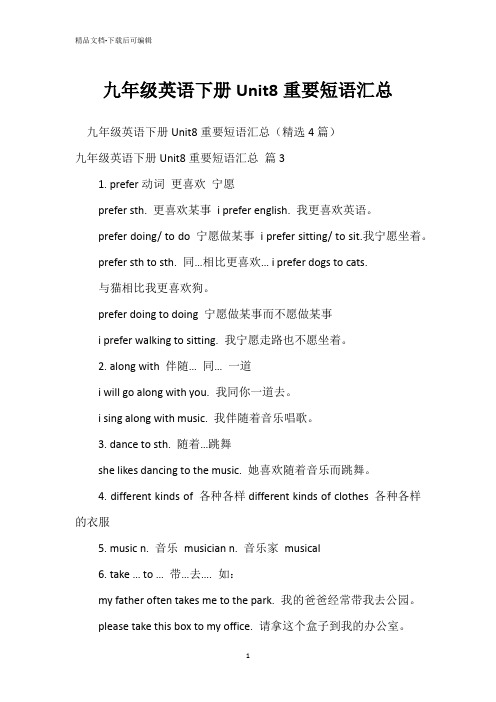
九年级英语下册Unit8重要短语汇总九年级英语下册Unit8重要短语汇总(精选4篇)九年级英语下册Unit8重要短语汇总篇31. prefer动词更喜欢宁愿prefer sth. 更喜欢某事i prefer english. 我更喜欢英语。
prefer doing/ to do 宁愿做某事i prefer sitting/ to sit.我宁愿坐着。
prefer sth to sth. 同…相比更喜欢… i prefer dogs to cats.与猫相比我更喜欢狗。
prefer doing to doing 宁愿做某事而不愿做某事i prefer walking to sitting. 我宁愿走路也不愿坐着。
2. along with 伴随… 同… 一道i will go along with you. 我同你一道去。
i sing along with music. 我伴随着音乐唱歌。
3. dance to sth. 随着…跳舞she likes dancing to the music. 她喜欢随着音乐而跳舞。
4. different kinds of 各种各样different kinds of clothes 各种各样的衣服5. music n. 音乐musician n. 音乐家musical6. take … to … 带…去…. 如:my father often takes me to the park. 我的爸爸经常带我去公园。
please take this box to my office. 请拿这个盒子到我的办公室。
7. remind sb. of sb./sth. 提醒使…记起….this song reminds him of his mother. 这首歌使他记起了他的妈妈。
8. clear adj. 清楚的,清澈的clearly adv. 清楚地9. be important to sb. 对…重要be important for sb. to do. 做某事对某人很重要10. unfortunately adv. 不幸运地fortunately adv. 幸运地11. look for 寻找my pen is lost. could you help me look for it?我的笔丢了。
- 1、下载文档前请自行甄别文档内容的完整性,平台不提供额外的编辑、内容补充、找答案等附加服务。
- 2、"仅部分预览"的文档,不可在线预览部分如存在完整性等问题,可反馈申请退款(可完整预览的文档不适用该条件!)。
- 3、如文档侵犯您的权益,请联系客服反馈,我们会尽快为您处理(人工客服工作时间:9:00-18:30)。
新目标英语九年级第八单元短语动词小结
常见短语动词结构有下面几种:
1.动词+副词如:give up 放弃turn off 关掉stay up 熬夜
这种结构有时相当于及物动词,如果其宾语是代词,就必须放在动词和副词之间,如果是名词,则既可插在动
词和副词之间,也可放在短语动词后。
2. 动词+介词如:listen of 听look at 看belong to 属于这种结构相当于及物动词,后面跟宾语。
3. 动词+副词+介词如:come up with 提出,想出run out of 用完,耗尽
4. 动词+名词(介词) 如:take part in参加catch hold of 抓住
1.cheer (sb.) up使(某人)高兴、振作如:cheer me up 使我高兴clean up 打
扫clean-up n.打扫
2. homeless adj. 无家可归的 a homeless boy 一个无家可归的男孩
home n. 家
3. hand out 分发hand out bananas
give out 分发 give out sth to sb. 分….给某人
give up doing 放弃…give up smoking 放弃吸烟
give away 赠送捐赠give away sth. to …. give away money to kids
give sb. sth. 给某人某东西give me money 给我钱
give sth. to sb. 给某人某东西give money to me 给我线
4. sick adj. 生病的作表语、定
语 ill adj. 生病的作表语,不能作定语
5. volunteer to do v. 志愿效劳、主动贡献
volunteer n. 志愿者
6. come up with 提出想出=== think up 想出
catch up with 赶上追上
7. put off doing 推迟做某事
put on 穿上(指过程)
put up 张贴
8. write down 写下记下
9. call up 打电话
make a telephone call 打电话
10. set up 成立建立
The new hospital was set up in 2000. 这座医院是在2000年成立的。
11. each 每个各自的强调第一个人或事物的个别情况常与of 连用
every 每个每一个的一切的则有“全体”的意思不能与of 连用
12. put …to use 把… 投入使用,利用
They put the new machine to use. 他们把新机器投入使用
13. help sb. (to) do 帮助某人做某事help him (to) study
help sb. with sth. 帮助某人做某事help him with English
help do 帮助做某事help study
14. plan to do 计划做某事
plan + 从句
I plan to go to Beijing. === I plan (that) I will go to Beijing. 我计划去北京。
15. spend … doing 花费…做… I spent a day visiting Beijing. 我花了一天的时间去参观北京。
spend… on sth.花费…在… I spent 3 years on English.
16.not only … but (also) … 不但… 而且… 用来连接两个并列的成分
(1)引导以not only …but (also)… 开头的句子往往引起部分倒装。
因此⑴Not only do I feel good but (also)…. 是倒装句。
也是说得要把前面的句子中的助动词或者是情态动词放在主语的前面。
如:
①Not only can I do it but (also) I can do best. 我不仅能做到而且做得最好。
⑵No t only…but (also)… 接两主语时,谓语动词随后面的主语人称和
数的变化也就是就近原则如:
①Not only Lily but (also) you like cat. 不仅莉莉而且你也喜欢猫。
②Not only you but (also) Lily likes cat. 不仅你而且莉莉喜欢猫。
常见的就近原则的结构有:
Neither… nor…即不…也不… (两者都不)
Neither you nor I like him. 我和你都不喜欢他。
Either… or… 不是…就是… (两者中的一个)
Either Lily or you are a student.
Not only …but (also)…
There be
17. join 参加(指参加团体、组织) 如:join the Party 入党
take part in 参加(指参加活动) 如:
take part in sports meeting 参加运动会
18. ①run out of == use up 用完用尽
I have run out of money.== I have used up money. 我已经用完了钱。
②run away 逃跑The monkey has run away from the zoo.这只猴子已经从动物园里逃跑了。
③run to + 地方跑到某地
19. take after (在外貌、性格等方面)与(父母等)相像
be similar to 与..相像
take after 相像
look after 照顾
take care of 照顾
20. work out 算出结局
The situation worked out quite well. 情况的结局非常好
Have you worked out this math problem? 你已经算出这道数学问题了吗?
21. hang out 闲荡闲逛
I like to hang out at mall with my friends. 我喜欢和我的朋友一起去购物中心闲荡。
22. be able to do 能会
be unable to do 不能不会
23. thank you for doing 谢谢做某事如:
thank you for helping me 谢谢做帮助我。
